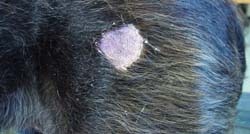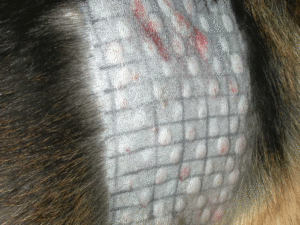-
Adopt
-
Veterinary Care
Services
Client Information
- What to Expect – Angell Boston
- Client Rights and Responsibilities
- Payments / Financial Assistance
- Pharmacy
- Client Policies
- Our Doctors
- Grief Support / Counseling
- Directions and Parking
- Helpful “How-to” Pet Care
Online Payments
Emergency: Boston
Emergency: Waltham
Poison Control Hotline
-
Programs & Resources
- Careers
-
Donate Now
 Klaus Loft, DVM (practice limited to dermatology)
Klaus Loft, DVM (practice limited to dermatology)
Dermatology Service
dermatology@angell.org
617-524-5733

This is not ringworm! It is a common staphylococcal infection as seen in many allergic dogs (superficial spreading pyoderma)
Skin and ear infections are common problems
As many as 60-75% of all pet visits to veterinary clinics and emergency hospitals in North America and Europe are for various dermatologic problems: itching; chewing paws; “hot spots;” ear infections; hair loss; or greasy, odorous, or scaling skin. Many of these recurring or chronic skin and ear problems are secondary to allergies.
Dogs and cats can suffer just like their human guardians from allergies to food allergens and/or environmental allergens, and the numbers in both pets and humans are increasing in frequency. Allergies are mostly a life long ordeal for cats and dogs, and the secondary infections of skin and ears are often the biggest problem for our allergic pets.
In dogs, we used to notice a certain breed predisposition (Cocker Spaniels, West Highland White terriers, German Shepherd Dogs and Labradors), but we have noticed a change in this pattern compared to 10 years ago. Today, allergies appear to be less breed-specific and affect as many as 15-20% of the pet animal population.
Allergies to fleas, food, pollen and molds
If we look at the different forms of allergies we encounter here at Angell Animal Medical Center, the frequency of flea bite-induced outbreaks are significantly reduced compared to outbreaks in the 1980’s and 1990’s largely due to the highly improved and effective spot-on treatment that most pet owners use regularly to prevent flea and tick problems. The total number of seasonal and non-seasonal allergy-induced skin problems is relatively constant in New England, and many of these patients can actually experience relief by addressing their life-long allergies. More and more dogs and cats are being allergy tested to identify the best treatment for these chronic allergies, and many of these patients today are successfully managed with either desensitization treatments and/or medical management options specifically put together for each canine or feline patient.
It is important to note that food allergies are not something we can “test for” in veterinary medicine, so our Angell Dermatology staff help these patients by virtue of strict elimination diet trials and restricted diet ingredients in a combination with various other medical management options.
If your pet has frequent ear infections, has discolored fur around the paws and lower legs, frequent problems with itchy skin, hair loss and/or scaling fur, greasy hair coat, and odor, consider contacting your primary care veterinarian, and ask if a referral for an allergy consult would be appropriate for your pet. For more information, please visit www.angell.org/dermatology or call 617-524-5733.
